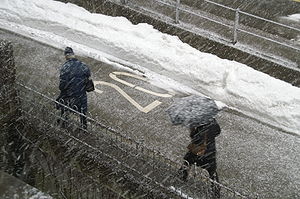rusk
Jump to navigation
Jump to search
See also: Rusk
English
[edit]Etymology
[edit]Borrowed from Spanish or Portuguese rosca (“a twist or roll of bread”)
Pronunciation
[edit]- (General American, Received Pronunciation) IPA(key): /ɹʌsk/
Audio (Southern England): (file) - Rhymes: -ʌsk
Noun
[edit]rusk (countable and uncountable, plural rusks)

- a rectangular, hard, dry biscuit
- 1719 May 6 (Gregorian calendar), [Daniel Defoe], The Life and Strange Surprizing Adventures of Robinson Crusoe, […], London: […] W[illiam] Taylor […], →OCLC:
- […] he brought a large basket of rusk or biscuit, and three jars of fresh water, into the boat.
- a twice-baked bread, slices of bread baked until they are hard and crisp (also called a zwieback)
- 1956, Delano Ames, chapter 25, in Crime out of Mind[1]:
- A newly-arrived couple at the next table […] admitted that “this was more like” and that if the Alpenrose could also produce a proper cup of tea it would be just like home. Bill Andreyef, who was eating a lightly-boiled egg and a rusk, regarded the other diners with resentment.
- a weaning food for children
- a cereal binder used in meat product manufacture
Synonyms
[edit]Translations
[edit]light, soft bread, often toasted or crisped in an oven
|
Faroese
[edit]Etymology
[edit]Pronunciation
[edit]Noun
[edit]rusk n (genitive singular rusks, plural rusk)
Declension
[edit]| Declension of rusk | ||||
|---|---|---|---|---|
| n3 | singular | plural | ||
| indefinite | definite | indefinite | definite | |
| nominative | rusk | ruskið | rusk | ruskini |
| accusative | rusk | ruskið | rusk | ruskini |
| dative | ruski | ruskinum | ruskum | ruskunum |
| genitive | rusks | rusksins | ruska | ruskanna |
Norwegian Bokmål
[edit]Etymology
[edit]From ruske.
Noun
[edit]rusk n (definite singular rusket, indefinite plural rusk, definite plural ruska or ruskene)
Norwegian Nynorsk
[edit]Etymology 1
[edit]Noun
[edit]rusk n (definite singular rusket, indefinite plural rusk, definite plural ruska)
Etymology 2
[edit]From ruske.
Noun
[edit]rusk n (definite singular rusket, indefinite plural rusk, definite plural ruska)
Etymology 3
[edit]Related to ruse.
Noun
[edit]rusk n (definite singular rusket, indefinite plural rusk, definite plural ruska)
Etymology 4
[edit]Likely from ruske.
Adjective
[edit]rusk (masculine and feminine rusk, neuter ruskt, definite singular and plural ruske, comparative ruskare, indefinite superlative ruskast, definite superlative ruskaste)
References
[edit]- Entry “rusk” in: Bokmålsordboka / Nynorskordboka by Universitetet i Oslo & Språkrådet.
Swedish
[edit]
Noun
[edit]rusk n
- bad rainy (or snowy, slushy, misty, windy, stormy, cloudy etc) weather
- Synonym: ruskväder
- regn och rusk
- rain and bad weather (idiomatic phrasing)
Declension
[edit]| Declension of rusk | ||||
|---|---|---|---|---|
| Uncountable | ||||
| Indefinite | Definite | |||
| Nominative | rusk | rusket | — | — |
| Genitive | rusks | ruskets | — | — |
Derived terms
[edit]References
[edit]Categories:
- English terms borrowed from Spanish
- English terms derived from Spanish
- English terms borrowed from Portuguese
- English terms derived from Portuguese
- English 1-syllable words
- English terms with IPA pronunciation
- English terms with audio links
- Rhymes:English/ʌsk
- Rhymes:English/ʌsk/1 syllable
- English lemmas
- English nouns
- English uncountable nouns
- English countable nouns
- English terms with quotations
- South African English
- Faroese terms with IPA pronunciation
- Faroese lemmas
- Faroese nouns
- Faroese neuter nouns
- Norwegian Bokmål lemmas
- Norwegian Bokmål nouns
- Norwegian Bokmål neuter nouns
- Norwegian Nynorsk terms inherited from Old Norse
- Norwegian Nynorsk terms derived from Old Norse
- Norwegian Nynorsk lemmas
- Norwegian Nynorsk nouns
- Norwegian Nynorsk neuter nouns
- Norwegian Nynorsk adjectives
- Swedish lemmas
- Swedish nouns
- Swedish neuter nouns
- Swedish terms with usage examples
